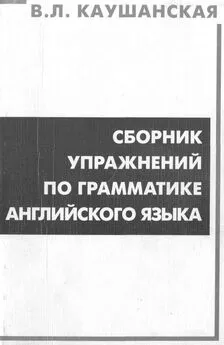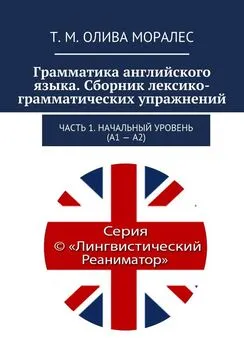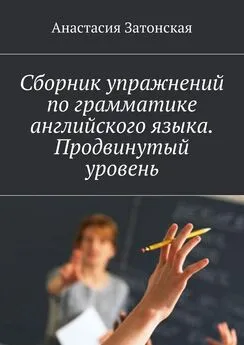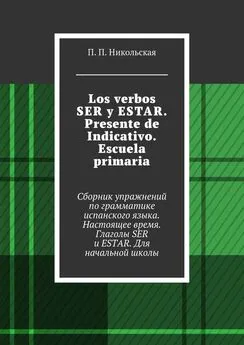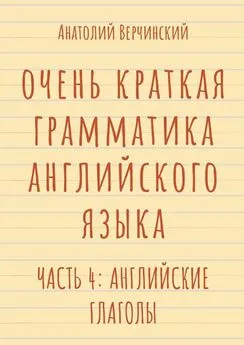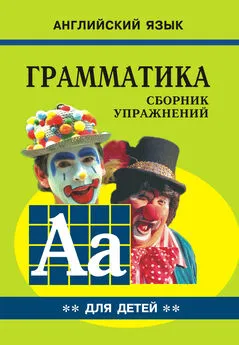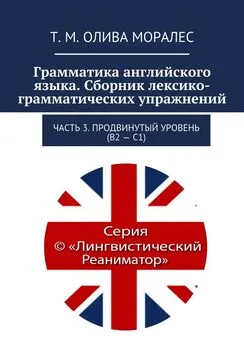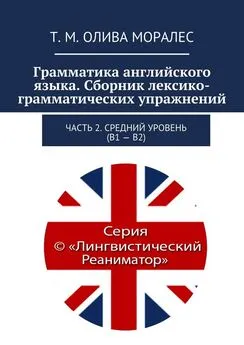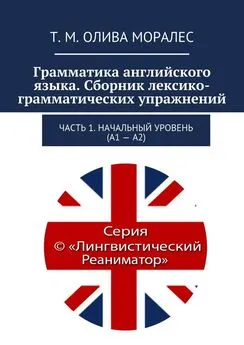В. Каушанская - Сборник упражнений по грамматике английского языка
- Название:Сборник упражнений по грамматике английского языка
- Автор:
- Жанр:
- Издательство:неизвестно
- Год:неизвестен
- ISBN:нет данных
- Рейтинг:
- Избранное:Добавить в избранное
-
Отзывы:
-
Ваша оценка:
В. Каушанская - Сборник упражнений по грамматике английского языка краткое содержание
Сборник упражнений по грамматике английского языка - читать онлайн бесплатно полную версию (весь текст целиком)
Интервал:
Закладка:
1. Annette was completely dazed. (Murdoch) 2. Their highest concept of right conduct, in his case, was to get a job. (London) 3. I'm five foot eleven in my socks. (Braine) 4. Sally, herself, was quite content for a while to enjoy becoming acquainted with her son, washing and feeding him, taking him for walks in thej bush, singing him to sleep. (Prichard) 5. Mr. de Morfe was as; generous and hail-fellow-well-met with them as ever.' (Prichard)\ 6. I am cold. And I always was such a one for being warm.» (Mansfield) 7. Your resemblance to your mother is very striking.] (Murdoch) 8. He did not answer. I was aware again of that feeling] of discomfort. (Du Maurier) 9. I hated myself. My question had been degrading, shameful. (Du Maurier) 10. Their interests were' hers as well as the interests of everybody. (Prichard) 11. He's a good chap. He makes you feel it's worth while being alive. I (Lindsay) 12. Arrived here, his first act was to kneel down on a| large stone beside the row of vessels, and to drink a copious draught from one of them. (Lindsay) 13. Either course seemed unthinkable, without any connection with himself. (Lindsay) 14. The nightmare of my life has come true. We are in danger of our lives. We are white people in a Chinese city. (Buck) 15. The best thing is for you to move in with me and let the young lady stay with your mother. (Abrahams) 16. But she was herself again, brushing her tears away. (Lindsay) 17. The rest of the time was yours. (Douglas) 18. How do you feel physically? (Ch. Bronte] 19. Who are you? (Shaw) 20. The Irish are a philosophic as well as a practical race. Their first and strongest impulse is to make the best of a bad situation. (Dreiser)
1. Catherine smiled at me very __ (happy, happily) (Hemingway) 2. I felt very __ myself, (good, well) (Hemingway) 3. I felt __ when we started, (terrible, terribly) (Hemingway) 4. He sounded __ and __. (brisk, briskly; cheerful, cheerfully) (Priestley) 5. It wil sound __. (strange, strangely)' (Dickens) 6. The hay smelled __ (good, well) (Hemingway) 7. I write English __ (bad, badly); (Ch. Bronte) 8. I looked at her __ (attentive, attentively) (Ch. Bronte) 9. But don't look __, my little girl. It breaks my heart, (sad, sadly) (Ch. Sront'e) 10. He was looking at me __ and __ (grave, gravely; intent, intently) (Ch. Bronte) 11. It [the wine] tasted very __ after the cheese and apple, (good, well) (Hemingway) 12. The brandy did not taste __ (good, well) (Hemingway) 13. The pistol felt __ on the belt, (heavy, heavily) (Hemingway) 14. Silas received the message __. (mute, mutely) (Eliot) 15. I thought he looked __ (suspicious, suspiciously) (Hemingway)
1. How do you feel? (Hemingway) 2. The half hour he had with her... left him supremely happy and supremely satisfied with life. (London) 3. How to be shown things and make appropriate comments seems to be an art in itself. (Leacock) 4. She had her arms about him, murmuring his name in a pleading question, but he held her away from him. (Wilson) 5. From behind the verandah she heard these words: "I don't, Annette." Did father know that he called her mother Annette? (Galsworthy) 6. He did not grow vexed; though I continued icy and silent. (Ch. Bronte) 7. John Ferrier felt a different man now. (Conan Doyle) 8. I would suggest that in the meantime we remain perfectly quiet and keep these matters secret even from Oliver himself. (Dickens) 9. He [Harper Steger] was not poor. He had not even been born poor. (Dreiser) 10. Gilt held him immobile for only an instant... (Wilson) 11. As a gesture of proud defiance he had named his son Francis Nicholas. (Cronin)
1. Музыка звучала чудесно. 2. Этот цветок хорошо пахнет. 3. Ваши слова звучат странно. 4. Этот огурец горький на вкус. 5. Бифштекс хорошо пахнет. 6. Эта материя груба на ощупь. 7. Вода в этой местности плоха на вкус. 8. Эта нота звучит резко. 9. Я чувствую себя плохо. 10. Она выглядит хорошо. 11. Она чувствует себя хорошо. 12. Она только кажется хорошей. 13. Пирожное хорошее на вид. 14. Свисток прозвучал пронзительно. 15. Эти розы пахнут упоительно.
1. "It's no use," she said quietly. "I am bound to Morris." (Prichard) 2. Her feet were never bound as the Chinese then bound the feet of their girls. (Buck) 3. "I don't want to tell you," said Galahad. "But you are bound to have it." (Erskine) 4. "You are not bound to answer that question," he said to Rachel. (Collins) 5. One of them was later sent to board in a missionary school and she was compelled to lose the foot bandages. (Buck) 6. When she was sixteen she was a beauty. As the result she was compelled to go to the Emperor's palace. (Buck) 7. I was compelled to idleness. I had to listen to her long monologues on the Japanese. (Buck) 8. My mother was plainly fading. I was increasingly anxious about her. (Buck) 9. We were anxious to cooperate. 10. My father gave it to my mother. It is the only possession I was able to save. (Douglas)
1. On her going to his house to thank him, he happened to see her through a window. (Dickens) 2. To describe one's character is difficult and not necessarily illuminating. (Murdoch) 3. The three on the sofa rise and chat with Hawkins. (Shaw) 4. Nothing seemed to matter. (London) 5. To be wanted is always good. (Stone) 6. Seeing you there will open up a new world. (Murdoch)!. Thereafter I read everything on the subject. I came to know many Negroes, men and women. (Buck) 8. Elaine, this Jll-advised behaviour of yours is beginning to have results. (Erskine) 9. Presently all, was silent. They must have gone through the service doors into the kitchen quarters. (Du Maurier) 10. The citizens of occupied countries were to be subjugated individually. (Wescoit) 11. It was all wrong this situation. It ought not to be happening at all. (Du Maurier) 12. My way is not theirs, it is no use trying to run away from them. (Lindsay) 13. No one got the better of her, never, never. (Du Maurier) 14. Lewisham stopped dead at the corner, staring in blank astonishment after these two figures. (Wells) 15.... We and all the people have been waiting patient for many an hour. (Jerome K. Jerome) 16, One cannot help admiring the fellow. (Dickens) 17. Then he [Tom] gave a low distinct whistle. It was answered from under the bluff. (Twain) 18. The girl [Aileen] was really beautiful and much above the average intelligence and force. (Dreiser) 19. This religion did give promise of creating a new society. There all men could be equally valuable as human beings. (Buck) 20. We must begin here and now to show. Thus we might prove our difference from those white men. (Buck)
1. The family
still at table, but they had finished breakfast. (Twain) 2. There
a crowd of soldiers along the fence in the infield. (Hemingway) 3.... the band
, the crowd
partially
, and Horatio Fizkin, Esquire, was permitted to proceed. (Dickens) 4. Down by the Embankment... a band of unemployed
dismally with money-boxes. (Galsworthy) 5. The multitude
something else to do than to read hearts and interpret dark sayings. (Ch. Bronte) 6. The newly married pair, on their arrival in Harley Street, Cavendish Square, London
by the chief butler. (Dickens) 7. There
a dreaminess, a preoccupation, an exaltation, in the maternal look which the girl could not understand. (Hardy) 8. The company
cool and calm. (Dickens) 9. As of old, nineteen hours of labour a day
all too little to suit him. (London) 10. There
still two hours of daylight before them. (Aldington) 11. At last they came into a maze of dust, where a quantity of people
over one another... (Dickens) 12. Tom's whole class
of a pattern-restless, noisy and troublesome. (Twain) 13. A group of men
guarded by carabinieri. (Hemingway) 14. The loving couple
no longer happy. (Reade)
1. Huckleberry's hard pantings __ his only reply, (was, were) (Twain) 2. There __ many a true word spoken in jest, Mr. Cokane. (is, are) (Shaw) 3. Each of us __ afraid of the sound of his name, (was, were) (Bennett) 4. On such meetings five minutes __ the time allotted to each speaker, (was, were) (London) 5. Neither his father nor his mother __ like other people... (was, were) (Dreiser) 6. It was dark and quiet. Neither moon nor stars __ visible. (was, were) (Collins) 7. Plenty of girls __ taken to me like daughters and cried at leaving me... (has, have) (Shaw) 8. He and I __ nothing in common, (has, have) (Galsworthy) 9. But I wonder no wealthy nobleman or gentleman __ taken a fancy to her: Mr. Rochester, for instance, (has, have) (Ch. Bronte) 10. To be the busy wife of a busy man, to be the mother of many children ... __, to his thinking, the highest lot of woman, (was, were) (Trollope) 11. Her family __ of a delicate constitution, (was, were) (E. Вгопte) 12. Hers __ a large family, (was, were) 13. "Well," says my lady, " __ the police coming?" (is, are) (Collins) 14. Nobody __ I am here, (knows, know) (London) 15. But after all, who __ the right to cast a stone against one who __ suffered? (has, have; has, have) (Wilde) 16. There are men who __ dominion from the nature of their disposition, and who __ so from their youth upwards, without knowing... that any power of dominion belongs to them, (exercises, exercise; does, do) (Trollope) 17. Plain United States __ good enough for me. (is, are) (London) 18. He half started as he became aware that someone near at hand __ gazing at him. (was, were) ((Aldington) 19. Fatting cattle __ from 5 to 10 gallons of water a head daily, (consume, consumes) (Black) 20. She is supposed to have all the misfortunes and all the virtues to which humanity __ subject, (is, are) (Trollope) 21. It was a market-day, and the country people __ all assembled with their baskets of poultry, eggs and such things... (was, were) (Thackeray) 22. The precept as well as the practice of the Primitive Church __ distinctly against matrimony, (was, were) (Wilde) 23....Ratterer and Hegglund..., as well as most of the others, __ satisfied that there was not another place in all Kansas City that was really as good, (was, were) (Dreiser) 24. Twelve years __ a long time, (is, are) (Galsworthy) 25. There __ a great many ink bottles, (was, were) (Dickens) 26. May and I — just friends, (is, are) (Keating) 27. The bread and butter __ for Gwendolen, (is, are) (Wilde) 28. I am afraid it is quite clear, Cecily, that neither of us __ engaged to be married to anyone, (is, are) (Wilde) 29. It __ they that should honour you. (is, are) (Trollope) 30. Great Expectations by Dickens __ published in I860, (was, were) 31. The family party __ seated round the table in the dark wainscoted parlour... (was, were) (Eliot) 32. Everybody __ clever nowadays, (is, are) (Wilde) 33. There __ a number of things, Martin, that you don't understand, (is, are) (Wilde) 34. The number of scientific research institutes in our country __ very large. (is, are) 35. Her hair, which __ fine and of medium brown shade, __ brushed smoothly across the top of her head and then curled a little at each side, (was, were; was, were) (Priestley) 36. After some apologies, which __ perhaps too soft and sweet... the great man thus opened the case, (was, were) (Trollope) 37. It was as if the regiment __ half in khaki, half in scarlet and bearskins: (was, were) (Galsworthy) 38. Youth and Age __ a weekly, and it had published two-thirds of hjs twenty-one-thousand-word serial when it went out of business, (was, were) (London) 39. There __ a number of men present, (was, were) (Walpole) 40....the flowers came in such profusion and such quick succession that there __ neither time nor space to arrange them, (was, were) (Heytn)
Читать дальшеИнтервал:
Закладка:
